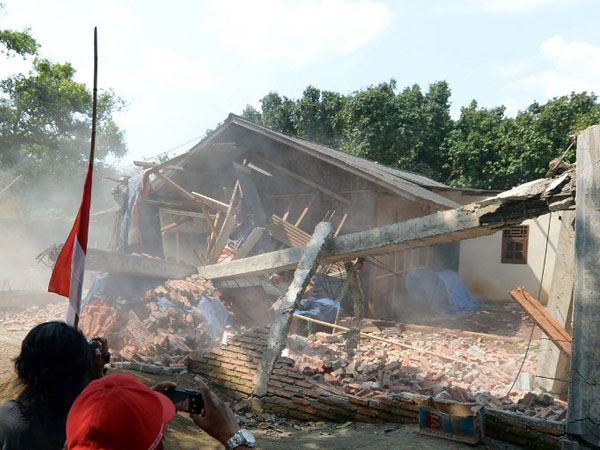Indonesian city tears down church in front of worshippers

Indonesian people take photos as civilian policemen demolish an undercontruction building of the Taman Sari Batak Christian Protestant Church in Bekasi on the outskirts of Jakarta on March 21, 2013. A local government in Indonesia demolish a church in front of its weeping congregation on March 21 as Muslim protesters branded them “infidels”. AFP PHOTO / ADEK BERRY
BEKASI, Indonesia—An Indonesian city government demolished a church in front of its weeping congregation Thursday, as Muslim protesters egged on workers and branded the Christians “infidels.”
Dozens in the 100-strong congregation wailed as a digger tore down the brick walls, with worshippers accusing the government of “criminalizing our religion,” in a sign of increasing intolerance in the world’s largest Muslim-majority nation.
“My heart is aching and I feel numb watching my church collapse. I went to this church for 11 years,” Megarenta Sihite, 46, told AFP, wiping away tears as fellow worshippers, dressed in black, hugged each other.
“Our church can collapse but not our faith. We will continue to come here for Sunday mass.”
As the walls of the Taman Sari Batak Christian Protestant Church — at the center of a planning row — crumbled, police in Bekasi city on the outskirts of Jakarta, dispersed 200 Muslim women who sneaked onto the church land chanting Koranic verses.
Article continues after this advertisementAlong the road Muslim protesters held back by a police cordon had chanted “Knock the church down now,” and “Allahu Akbar” (God is greater).
Article continues after this advertisementOne man shouted through a loudspeaker: “They’re infidels and they’ve built their church without permission.”
Members of the congregation had earlier begged the Bekasi city government to halt the demolition, with children clutching signs reading “please do not dismantle our church.”
Reverend Advent Nababan shed tears as the building was pulled down. “You just witnessed the government criminalizing our religion,” he said.
The local government had ordered the demolition of the church for being built, in October 2012, without a legal permit.
However the congregation said the permit was repeatedly and unfairly rejected after they had spent 13 years worshipping at the site unopposed in a temporary shelter.
Nababan said the church had obtained broad support from the Muslim community before building started. Several neighbours confirmed with AFP they had no problem with a church in the vicinity.
Ninety percent of Indonesia’s 240 million people identify themselves as Muslim and the country’s constitution guarantees freedom of religion.
The Setara Institute of Peace and Democracy, however, says cases of intolerance are on the rise, with 543 incidents reported in 2011, up from 491 cases in 2009. More than 300 incidents were recorded in the first half of 2012.
Christians are among the main targets, along with worshippers who follow the Ahmadiyah and Shiite Islamic minority sects.
Setara deputy director Bonar Tigor Naipospos said the permit issue was being used as an “excuse.”
“The problem is the government has shown no political will to stop cases of intolerance in the country. It does not demand the law be upheld and that perpetrators are brought to account,” he said.
The Batak Protestant Church has been at the forefront of attacks in the greater district of Bekasi. One congregation was pelted with rotten eggs and urine by Muslim hardliners who denied them entrance to their land, forcing them onto the street.
Naipospos said more of the 39 Batak Christian Protestant houses of worship in Bekasi were likely to face trouble as only 10 had been granted building permits.